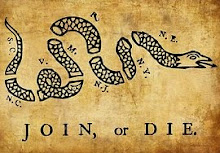The Fed Trashes the Dollar
by Patrick J. Buchanan syndicated columnist.
"If it is the first responsibility of the Federal Reserve to protect the dollars that Americans earn and save, is it not dereliction of duty for the Fed to pursue a policy to bleed value from those dollars? For that is what Chairman Ben Bernanke is up to with his QE2, or "quantitative easing."
Translation: The Fed is committed to buy $600 billion in bonds from banks and pay for them by printing money that will then be deposited in those banks. The more dollars that flood into the economy, the less every one of them is worth.
Bernanke is not just risking inflation. He is inducing inflation. [My emphasis]
He is reducing the value of the dollar to make U.S. exports more competitive and imports more expensive, so that we will consume fewer imports. He is trying to eliminate the U.S. trade deficit by treating the once universally respected dollar like the peso of a banana republic.
Sarah Palin has nailed cold what Bernanke is about:
'We shouldn't be playing around with inflation. It's not for nothing Reagan called it 'as violent as a mugger, as frightening as an armed robber and as deadly as a hit man.'
"The Fed's pump-priming addiction has got our small businesses running scared and our allies worried. The German finance minister called the Fed's proposals 'clueless.' When Germany, a country that knows a thing or two about the dangers of inflation, warns us to think again, maybe it's time for Chairman Bernanke to cease and desist.
"We don't want temporary, artificial economic growth bought at the expense of permanently higher inflation which will erode the value of our incomes and our savings."
Egging Ben on is the Nobel-prize winning New York Times columnist Paul Krugman. Fed policy is too timid, says Krugman.
When Bernanke said we are not "going to try to raise inflation to a super-normal level," he blew it, says Krugman, and "there goes the best chance the Fed's plan might actually work."
What the Fed should do, he says, is change expectations "by leading people to believe that we will have somewhat above-normal inflation ... which would reduce the incentive to sit on cash."
But "sit on cash" is a definition of saving. Is saving bad? Once, Americans were taught that saving was a good thing.
Not to Krugman. He wants to panic the public into believing the money they have put into savings accounts and CDs will be rapidly eaten up by Fed-created inflation, so they will run out and spend that money now to get the economy moving again.
Whatever the economics of this, the morality of it is appalling.
Imagine a husband and wife with a bright child who are saving to send the boy to the best prep school, then Princeton, then, hopefully, Harvard or Yale Law, so the boy can realize his dream of being a great lawyer and perhaps one day sitting on the Supreme Court.
Krugman is recommending that the Fed goose the money supply to cause a general fear of inflation, so that couple will run and get their money out of the bank and start spending it, because, if they don't, their own government will start destroying the value of their savings.
This is Weimar economics.
As for inflation, are not the prices of gold, silver, oil and other commodities flashing signals that it is on the way?
In denouncing Bernanke, even the Chinese are not all wrong. They have followed the monetary policy we created at Bretton Woods in 1944, where we tied the dollar to gold at $35 an ounce, while other nations tied their currencies to the dollar at fixed rates of exchange.
China is being denounced for manipulating its currency when Beijing is adhering to a strict dollar-renminbi exchange rate, while our Fed is manipulating the dollar price to seek competitive advantage.
The other Chinese complaint is that they lent us trillions to buy Chinese goods and now we are robbing them by depreciating the dollar-denominated Treasury bonds they accepted in return for their goods.
Pay back your banker in Monopoly money, and you will find you are soon unable to borrow from anyone anywhere.
In four years, the American people have delivered three straight votes of no confidence in the U.S. government. The Fed, however, retains a confidence that it does not deserve, when one considers that, when it was created in 1913, a $20 bill could be exchanged for a $20 gold piece.
Today, it takes seventy $20 bills to buy a $20 gold piece, which means the dollar can buy in 2010 what you could get for 2 pennies in 1910. Quite a record for a central bank set up to protect the dollar.
If Bernanke's inflation does not generate growth, confidence in the Fed will also vanish. Then a crisis of capitalism will be at hand.
Historians will not deal kindly with the men who traded the horse of U.S. economic nationalism for the rabbit of the Global Economy."
Monday, November 15, 2010
Subscribe to:
Post Comments (Atom)

No comments:
Post a Comment